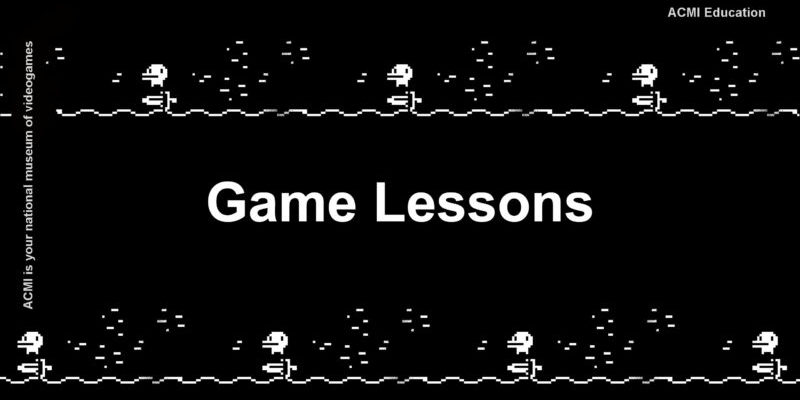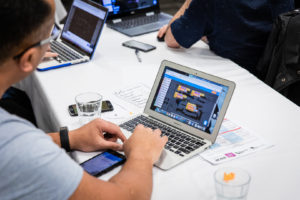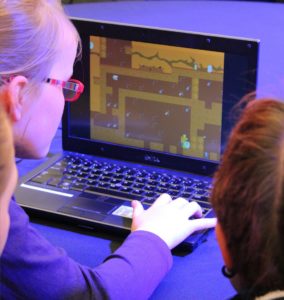Game Changers in the Classroom: the use of videogames in education

‘There is an absolute beauty in games that everyone should experience,’ says Vincent Trundle, ACMI Digital Education Producer.
On the surface, video games provide entertainment. Underneath, they are a powerful medium to connect people around the world, provide mental and physical stimulation, and offer an engaging approach to education and training in schools and work. The Australian Centre for Moving Image (ACMI) celebrates the power of videogames and currently offers several programs to support teachers to embrace their educational potential. ACMI encourages students and teachers to learn by doing, providing opportunities for students to create and play videogames that help them develop in educational, social and physical ways.
Like film and television, there is a huge range of game genres, and many enhance creativity, problem-solving, and collaboration, being fun all the while. Although you may not think yourself a gamer, you may be surprised how many you know, such as “Words with Friends”, an online game very similar to “Scrabble” in which you take it in turns with friends to place words on a board. You may have also played a version of “Math Blaster” or “Maths Invaders” to test the speed of your arithmetic. Many will know the popular sandbox game “Minecraft” where players can work in teams to build whatever they choose, replicating reality or fictional worlds for play. Minecraft Education Edition has now been provided to Victorian schools by the State Department of Education and Training as a cross-curriculum learning tool.
Though videogames are everywhere, there are common obstacles faced by teachers wanting to use videogames in their classroom. Such barriers include the lack of technical confidence, support or infrastructure, feeling out of depth or unfamiliar with videogames, and one of the largest hurdles is societal disapproval – whether it comes from parents, peers, or elsewhere. People worry that children waste time “just playing games” or are concerned that games contribute to violence or anti-social behaviour (which is regularly debated but studies reveal no long-term link between exposure to violent gameplay and aggression). It is these fixed ideas that ACMI aim to address with their programs.
‘It’s about understanding what game-based learning can be,’ says Kate Ficai, ACMI Games in Education Coordinator. ‘Students can be making, playing, or watching games – each offer rich educative opportunities. Games can also provide students with valuable insights to industries and applications that go beyond play.”

An evaluative study in 2018 performed by Bond University and the Interactive Games & Entertainment Association have shown that video and computer games are no longer just about entertainment – they have a variety of applications including in aged care, the workplace, health and education. Because skills involved in gameplay often involve abstract and high-level thinking and dexterity, most of the people surveyed play games for brain stimulation and/or to help manage pain and improve hand-eye coordination. A follow up study in 2019 (also conducted at Bond University) recognised the power of videogames for: emotional and social wellbeing, mental stimulation and fighting dementia, stress reduction, and maintaining social connections.
The advancement of technology that is incorporated in games, including augmented reality (AR), virtual reality (VR), and artificial intelligence (AI), boosts their interactive and engaging nature for learning. Defence Force pilots use simulators in flight training, and medical students can learn more from a simulated exploration of the body using VR than from lecture slides. VR has also been adopted to educate people on more serious and traumatic topics. Clouds over Sidra, a VR experience produced by UNICEF following a 12-year-old girl in the Za’atari Refugee Camp in Jordan, is used to discuss the Syrian Refugee Crisis in classrooms across the globe. Oscar Raby, VRTOV and former ACMI X resident, developed a VR game called Assent that revisited his father’s traumatic experience of the 1973 Chilean military coup in a poetic letter dedicated to his father and a way of dealing with grief. Both the making and playing of games therefore have positive psychosocial benefits as people share their experiences.
Educator, game designer and researcher at University of the Sunshine Coast, Dr Colleen Stieler-Hunt spoke at the 2019 Education in Games Summit, presented by ACMI and the Voctorian Department of Education and Training, on the ability of gameplay to foster empathy and social engagement and to help build a sense of community. This is especially relevant to the many teachers and students engaged in flexible and remote learning due to COVID-19. While many students are distanced from their peers, they are still able to connect, play, communicate and collaborate together online.
Students and teachers do not need to be “gamers” to engage with the opportunities that educational gameplay and game design can offer. However, students who are more comfortable with game design may build their agency and leadership in the classroom by supporting their peers and teachers. Not only are videogames a valuable resource in education, but game creation itself offers a valuable learning experience. Within a game making team, students can take on different creative aspects: visuals, audio, production management, and coding.
ACMI’s online resource called Game Builder toolkit, guides teachers and students on how to create their own videogames. Designed in two parts, Game Builder caters both to beginners and those with some game making experience. Over ten modules, students explore the elements that make up videogames; exploring game mechanics, narrative, graphic design, coding, and music composition.

‘There is a game for everything,’ says Vince, wanting to ‘stretch videogames out over the curriculum’. Game content can span linguistics, mathematics, history, geography and more, and their creation utilises art and creativity, technology, and computer science. They even cover skills not typically taught in a classroom.
ACMI also provides professional development for educators through Game Lessons, helping them to harness the impact that videogames can have in their classroom and curriculum. Now in its third year, ACMI’s Game Lessons project is supported by the Victorian Department of Education and Training. The project fosters collaboration among teachers to create a community that builds resources and shares lesson plans. By sharing knowledge and research around videogames in the classroom, the project aims to build teacher confidence and capacity to deliver more effective learning programs.
Game Lessons is aimed at developing best practice for game-based learning and supports Victorian teachers to use videogames in their classrooms. If you would like to explore ways to incorporate videogames in your classroom or if you have great ideas to share, please contact Kate Ficai at [email protected]. The Games Lesson project is also working towards publishing a series of resources at the end of the year – so stay tuned!
Catriona Nguyen-Robertson
